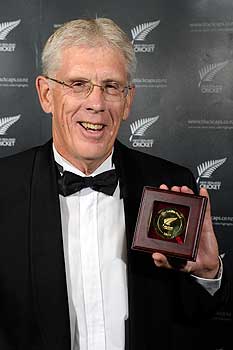MIL OSI –
Source: Massey University – Press Release/Statement:
Headline: PhD captures secret to cricket’s success
At least 10 players in the current Black Caps squad came through the cricket development programmes and competitions implemented by Alec Astle while Cricket New Zealand’s national development manager.

Alec Astle with his Bert Sutcliffe Medal
for outstanding services to cricket.
With all eyes currently on the Black Caps and their bid for World Cup glory, it is easy to forget how important grassroots participation is to the ongoing sustainability of any sport.
No one knows this better than Alec Astle, who has just completed his PhD thesis on how New Zealand Cricket revitalised its sport in the face of declining player levels in the late 1990s. The organisation’s player census figures show that player numbers grew from 75,479 when its development programme launched in 2000 to 112,000 players by 2012.
Mr Astle was New Zealand Cricket’s national development manager for 10 years and he embarked on his doctorate to capture everything he had learned about sport development in the process.
“There’s very little academic literature on sport development globally or academic training for practitioners working in community sport,” Mr Astle says.
“Training to grow and develop a sport so that it attracts and retains more participants at all levels is just not available in New Zealand.”
As a former teacher, deputy principal and cricket coach at Palmerston North Boys’ High School for 24 years, Mr Astle was determined to produce an academic study of sport development to fill the gap. He hopes to get parts of his thesis published in academic journals and to also produce an accessible textbook for sports administrators.
“Most sports practitioners are just too busy to undertake a project like this; I’m hoping my research will help other sporting organisations to revitalise, strengthen and grow their community-based foundations.”
Mr Astle says that in the past the national bodies of many sports focused on the development of elite athletes and teams, while their sports at a community level were predominantly run by volunteers.
“This traditional approach came under pressure from a range of societal changes, including different patterns of work, which meant people weren’t able to volunteer as much anymore. There was no national system of support for people who loved the sport purely for its own sake. It was more about preparing representative players and not lifelong participation for the majority of players at all levels.”
While he was New Zealand Cricket’s national development manager, Mr Astle developed a plan, programme and various pathways for players and coaches to cater for both competitive and social players in clubs and schools.
“Sports need programmes that aren’t intimidating if they want to capture parents and young players. Cricket began to provide support for parents to coach and kids to play, growing their skills over time.”
He says that while the efforts of enthusiastic volunteers are irreplacable, they need support and resources, especially if programmes are to maintain their quality across the country.
“My study shows that successful sport development requires a clear vision and leadership that takes a holistic view of the sport. You need a national plan that creates pathways for all players to develop and enjoy their sport and those pathways need to be surrounded by similarly aligned pathways for coaches, officials and adminstrators.
“Organisations also need to have a long-term commitment – there’s no point in one-off initiatives that run out of steam because of a lack of perseverance or resources.”
Mr Astle says the sport is capitalising on the Black Caps current success at the World Cup, in part, because of the years of development work by New Zealand Cricket over the past 15 years – programmes he helped to develop and implement.
“More than half of the current Black Caps and White Ferns teams have come through cricket development programmes and competitions,” he says.
“A good sport development plan widens and deepens the base of players in a supportive environment that makes the sport fun for everyone, especially at the entry level. Programmes need to be relevant and appealing if they are to attract, nurture and retain players.”
The 2015 Cricket World Cup has come at the perfect time for the sport in New Zealand. Player participation rates are high and the intense interest in the event provides a massive opportunity to attract more players to the game, Mr Astle says.
– –
]]>








